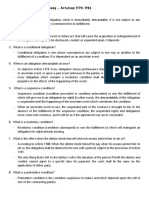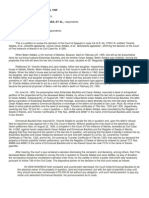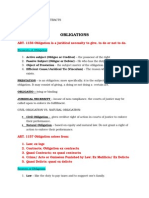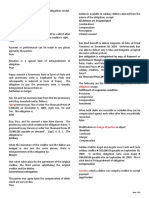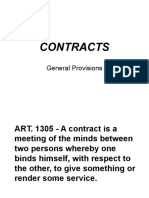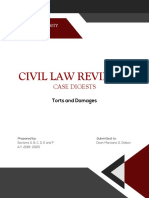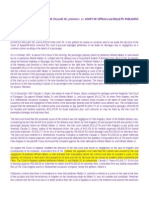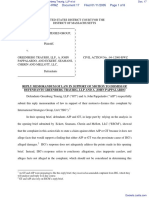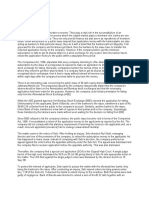CHAPTER 1 Arts. 1156 1162
CHAPTER 1 Arts. 1156 1162
Uploaded by
Vince Llamazares LupangoCopyright:
Available Formats
CHAPTER 1 Arts. 1156 1162
CHAPTER 1 Arts. 1156 1162
Uploaded by
Vince Llamazares LupangoOriginal Description:
Original Title
Copyright
Available Formats
Share this document
Did you find this document useful?
Is this content inappropriate?
Copyright:
Available Formats
CHAPTER 1 Arts. 1156 1162
CHAPTER 1 Arts. 1156 1162
Uploaded by
Vince Llamazares LupangoCopyright:
Available Formats
TITLE I, CHAPTER 1 General Provisions (Articles 1156-1162)
TITLE I - OBLIGATIONS
(Articles 1156-1304, New Civil Code)
CHAPTER 1 GENERAL PROVISIONS
(Arts. 1156-1162)
STUDY GUIDE: (10 JULY 2015 Friday)
1. Obligation defined. (Art. 1156)
(a) Explain why an obligation is a juridical necessity.
(b) Distinguish an obligation from a contract
2. Requisites or elements of an obligation:
(a)
(b)
(c)
(d)
Active subject (obligee or creditor)
Passive subject (obligor or debtor)
Object or prestation (subject matter of the obligation)
Juridical or legal tie (vinculum or efficient cause)
3. Distinction between obligation, right and wrong or injury;
Distinction between the following concepts: right of action and accrual
of cause of action.
CASES: Borbe vs. Calalo, G.R. No. 152572, October 5, 2007.
Elido vs. CA, G.R. No. 95441, December 16, 1992.
4. Elements of a legal wrong or injury, or the requisites in order that
a person may acquire a right of action in court against another to enforce
the performance of the latters obligation.
What is damnum absque injuria?
TITLE I, CHAPTER 1 General Provisions (Articles 1156-1162)
CASE: BECC vs. CA, G.R. No. 120639, Sept. 25, 1998, 296 SCRA 260.
5. Kinds of obligations from the viewpoint of subject matter :
Real obligation - obligation to give
(b) Personal obligation
(b.1.) Positive obligation to do (Art. 1167)
(b.2.) Negative obligation not to do (Art. 1168)
(a)
6. Kinds of obligations from the viewpoint of sanction :
Civil obligations the sanction is positive law
(b) Natural obligations the sanction is equity
(c) Moral obligations the sanction is conscience
(a)
7. Sources of obligations : (Art. 1157)
(a)
Law (Art. 1158)
CASE: Pelayo vs. Lauron, G.R. No. L-4089, January 12, 1990
(b)
Contracts (Art. 1159) NOTE: Correlate with Art. 1306
CASE: Prisma Construction and Development Corporation vs.
Menchavez, G.R. No. 160545, March 9, 2010
Quasi-contracts (Art. 1160)
(d) Crimes or delicts (Art. 1161) (See Art. 2142)
(e) Quasi-delicts/torts/culpa-aquiliana (Art. 1162)
quasi-delict defined (Art. 2176)
test of negligence (Art. 1173)
(c)
TITLE I, CHAPTER 1 General Provisions (Articles 1156-1162)
CASE: Umali vs. Bacani, G.R. No. L-40570, January 30, 1976
NOTE: Be able to give examples of obligations arising from each of the
sources under Article 1157.
2 principal kinds of quasi-contracts :
(c)
(d)
Negotiorum Gestio (Art. 2144)
Solutio Indebiti (Art. 2154)
NOTE: Know the requisites.
concept of quantum meruit
CASE: DPWH vs. Quiwa, G.R. No. 183444, February 8, 2012
8. Requisites for quasi-delict.
(a) Act or omission
(b) Fault or negligence
(c) Damage
10.
(d) Causal connection between
fault and damage
(e) No pre-existing contractual
relations
Scope of civil liability arising from crimes :
(a) restitution
(b) reparation
(c) indemnification
APPLICATION/PROBLEMS :
1. Under a building contract, Engr. So agreed to construct the house
of Mr. Rey for 6 months. On the other hand, Mr. Rey agreed to pay Engr.
So P3M after the construction is finished. Point out the elements of the
obligation in this legal scenario.
2. Christian and Carina entered into an agreement. For a
consideration of P200,000.00 to be given by Carina to him, Christian
3
TITLE I, CHAPTER 1 General Provisions (Articles 1156-1162)
agreed to attend mass for four consecutive Sundays. Is this obligation
legally enforceable?
3. On November 15, 2014, Derek entered into an agreement with
Caitlyn. Among other things, the parties agreed that: (a) Caitlyn will lend
P100,000.00 to Derek who promises to pay the loan on January 15, 2015;
and, (b) In case of non-payment, Derek will render free service as a
servant to Caitlyn until such time that Derek is able to raise the money
with which to pay his loan to Caitlyn. Is this agreement legally
enforceable?
4. Don, a merchant-farmer, was the owner of a ten-hectare land
planted to lanzones. On April 1, 2015, Don left for a pleasure trip to the
U.S. While Don was on vacation in the U.S., typhoon Babing devastated
the entire Philippines including the land owned by Don. Before the
typhoon, however, reached the Philippine area of responsibility, Conan, a
conscientious neighbour and friend of Don, employed six (6) farmers to
harvest the lanzones planted on the land of Don. As a result, Conan
incurred expenses amounting to P60,000.00. The employment of the
farmers and the harvest of the lanzones from the land of Don was
undertaken by Conan without the approval of Don as the latter was still in
the U.S. Upon the arrival of Don in the Philippines from his trip, may he
be compelled by Conan to refund the P60,000.00 expenses incurred?
5. You went to the bank and let the teller change your P1,000.00 bill.
Because of the negligence of the teller, she erroneously gave you 11
pieces of P100 bills. Can you be compelled to return the excess
considering the negligence of the banks teller?
6. While playing baseball with his friends, Jay broke the glass
window of Kay, his neighbour. The breakage was not made on purpose.
It was only an accident. Can Kay hold Jay liable for the damage?
7. Juan ordered ten-year old Pedro to climb a high and slippery
santol tree, and promised to give the boy 2 kilos of the santol he will be
able to pick. While climbing the tree, however, Pedros foot slipped. As a
result, Pedro fell from the tree to the ground and died instantaneously.
Will Juan be liable in damages for the death of Pedro?
4
TITLE I, CHAPTER 1 General Provisions (Articles 1156-1162)
*** END ***
You might also like
- Art 1158Document2 pagesArt 1158Danica BalinasNo ratings yet
- Corporation vs. Pinatubo Commercial, G.R. No. 176006, March 26, 2010)Document1 pageCorporation vs. Pinatubo Commercial, G.R. No. 176006, March 26, 2010)Vince Llamazares Lupango100% (1)
- Obligations and ContractsDocument115 pagesObligations and ContractsRafaelAndreiLaMadridNo ratings yet
- Chapter 2 - ObliconDocument35 pagesChapter 2 - ObliconHannah BarrantesNo ratings yet
- CHAPTER 2 (Arts. 1163-1178)Document10 pagesCHAPTER 2 (Arts. 1163-1178)Kaye RabadonNo ratings yet
- Article 1156-1178Document17 pagesArticle 1156-1178Mrij Kyzer100% (1)
- IpoyDocument3 pagesIpoyMark Leonard LopezNo ratings yet
- Differentiate Solutio Indebiti From Negotiorum GestioDocument3 pagesDifferentiate Solutio Indebiti From Negotiorum GestioKris Anne Delos Santos100% (1)
- Obligations and Contracts NotesDocument52 pagesObligations and Contracts NotesZuleira ParraNo ratings yet
- OBLICON FAQs - 1179-1192Document3 pagesOBLICON FAQs - 1179-1192BalangNo ratings yet
- Oblicon Reviewer 1156-1159Document10 pagesOblicon Reviewer 1156-1159Delmas Ibera100% (1)
- Novation NotesDocument11 pagesNovation NotesMaria Recheille Banac KinazoNo ratings yet
- Cheat CodeDocument6 pagesCheat CodeJustin TayabanNo ratings yet
- Coblaw Notes Art. 1156 1162 PDFDocument7 pagesCoblaw Notes Art. 1156 1162 PDFNicka Era CuencaNo ratings yet
- Digest Part 1 ObliconDocument9 pagesDigest Part 1 ObliconFncsixteen UstNo ratings yet
- CHAPTER 2 Arts. 1163 1178Document14 pagesCHAPTER 2 Arts. 1163 1178Vince Llamazares Lupango75% (4)
- Art 1156-1178Document3 pagesArt 1156-1178zetters0360% (5)
- Study Guide:: Reformation of InstrumentsDocument6 pagesStudy Guide:: Reformation of InstrumentsKelsey De GuzmanNo ratings yet
- Arts 1327-1348 (Oblicon)Document23 pagesArts 1327-1348 (Oblicon)dreaNo ratings yet
- Obligations and ContractsDocument42 pagesObligations and Contractshanasadako100% (76)
- Nature and Effect of ObligationsDocument7 pagesNature and Effect of ObligationsVin Valerio0% (1)
- Articles 1319 1346 Essential Requisites of Contracts Consent or Meeting of MindsDocument68 pagesArticles 1319 1346 Essential Requisites of Contracts Consent or Meeting of MindsBenjamin Jr VidalNo ratings yet
- Bar Probables Obligations and ContractsDocument87 pagesBar Probables Obligations and ContractsJulz Mortejo SalarzaNo ratings yet
- Oblicon ReviewerDocument6 pagesOblicon ReviewerFatima Elaine AtienzaNo ratings yet
- CASES Oblicon Article 1163-1165 Espejo FulltextDocument47 pagesCASES Oblicon Article 1163-1165 Espejo FulltextRubyFranzCabangbang-QuilbanNo ratings yet
- ARTICLE 1156 - 1160 DISCUSSION - Obligations and ContractsDocument6 pagesARTICLE 1156 - 1160 DISCUSSION - Obligations and ContractsKeith Jasper Mier100% (1)
- Mercantile Law Case Digests: Case Name Subject and Topic Facts Issue RulingDocument8 pagesMercantile Law Case Digests: Case Name Subject and Topic Facts Issue RulingJohn Dexter FuentesNo ratings yet
- Obligations and Contracts Article 1156-Article 2270Document136 pagesObligations and Contracts Article 1156-Article 2270Nea TanNo ratings yet
- CHAPTER 8 (Unenforceable Contracts)Document6 pagesCHAPTER 8 (Unenforceable Contracts)phoebe andamo67% (3)
- Civil Law 2 Cases - ObliconDocument48 pagesCivil Law 2 Cases - ObliconHon Yan BazarNo ratings yet
- Resolutory ConditionDocument2 pagesResolutory ConditionZaira PangesfanNo ratings yet
- Contract PerfectionDocument16 pagesContract PerfectionDante Escudero100% (2)
- 10 - Leny Villareal - 2 Legal Framework For GI Protection in TheDocument28 pages10 - Leny Villareal - 2 Legal Framework For GI Protection in TheBrunxAlabastroNo ratings yet
- Obligations and ContractsDocument8 pagesObligations and ContractsfmquitcoNo ratings yet
- Second Half Lecture NotesDocument27 pagesSecond Half Lecture NotesShingo TakasugiNo ratings yet
- 1 - General Provisions of ContractsDocument58 pages1 - General Provisions of ContractsAlyssa Coleen Patacsil Dolorito100% (1)
- Rescissible ContractsDocument17 pagesRescissible ContractsPreshy AlcarazNo ratings yet
- Chapter 1: General Provisions 1156. An Obligation Is A Juridical Necessity To Give, To Do or Not To DoDocument9 pagesChapter 1: General Provisions 1156. An Obligation Is A Juridical Necessity To Give, To Do or Not To DoGwenBañariaNo ratings yet
- Title IV EstoppelDocument1 pageTitle IV EstoppelAnonymous zDh9ksn100% (1)
- Art. 1156. An Obligation Is Juridical Necessity To Give, To Do or Not To DoDocument7 pagesArt. 1156. An Obligation Is Juridical Necessity To Give, To Do or Not To Doluis capulongNo ratings yet
- Loss of The Thing DueDocument61 pagesLoss of The Thing Due.No ratings yet
- Summary Essential Requisites of A ContractDocument19 pagesSummary Essential Requisites of A ContractCelina GonzalesNo ratings yet
- Premids Obligations PDFDocument58 pagesPremids Obligations PDFayasueNo ratings yet
- Dapat Gawin and Gagawa NG Duty Nakakatanggap NG Benefits SA Obligations. Yung Ibibigay Papasok Dito Yung Todo or Not To DoDocument5 pagesDapat Gawin and Gagawa NG Duty Nakakatanggap NG Benefits SA Obligations. Yung Ibibigay Papasok Dito Yung Todo or Not To DoChristine Reforma100% (1)
- Oblicon ReviewerDocument95 pagesOblicon ReviewerTimothy Castillon100% (4)
- Defective ContractsDocument11 pagesDefective ContractsRoselle Casiguran100% (3)
- Pro Rata: Jose, CPADocument4 pagesPro Rata: Jose, CPAKian Francis PeraltaNo ratings yet
- Contracts: General ProvisionsDocument94 pagesContracts: General Provisionsgilbert213No ratings yet
- ObliconDocument95 pagesObliconVanessa Evans CruzNo ratings yet
- Leung Ben vs. O'Brien - OBLICONDocument1 pageLeung Ben vs. O'Brien - OBLICONSU LAW CasepoolNo ratings yet
- Natural Obligations and Estoppel (CASE DIGEST)Document3 pagesNatural Obligations and Estoppel (CASE DIGEST)jealousmistress100% (1)
- ArrvaDocument1,946 pagesArrvaMacoy SambranoNo ratings yet
- KFKDFSBKFDocument474 pagesKFKDFSBKFMacoy SambranoNo ratings yet
- TITLE I, CHAPTER 1 - General Provisions (Articles 1156-1162)Document239 pagesTITLE I, CHAPTER 1 - General Provisions (Articles 1156-1162)Mark Dave SambranoNo ratings yet
- KFKDFSBKFDocument478 pagesKFKDFSBKFMacoy SambranoNo ratings yet
- KFKDFSBKFDocument473 pagesKFKDFSBKFMacoy SambranoNo ratings yet
- KFKDFSBKFDocument475 pagesKFKDFSBKFMacoy SambranoNo ratings yet
- STUDY GUIDE: (10 JULY 2015 - Friday) : TITLE I, CHAPTER 1 - General Provisions (Articles 1156-1162)Document126 pagesSTUDY GUIDE: (10 JULY 2015 - Friday) : TITLE I, CHAPTER 1 - General Provisions (Articles 1156-1162)Mark Dave SambranoNo ratings yet
- KabskxbaDocument967 pagesKabskxbaMacoy SambranoNo ratings yet
- KabskxbaDocument479 pagesKabskxbaMacoy SambranoNo ratings yet
- KabskxbaDocument1,949 pagesKabskxbaMacoy SambranoNo ratings yet
- TITLE I, CHAPTER 1 - General Provisions (Articles 1156-1162)Document122 pagesTITLE I, CHAPTER 1 - General Provisions (Articles 1156-1162)Mark Dave SambranoNo ratings yet
- Comm FatsDocument1 pageComm FatsVince Llamazares LupangoNo ratings yet
- CIVREV2 1920 Torts DamagesDigestDocument154 pagesCIVREV2 1920 Torts DamagesDigestVince Llamazares LupangoNo ratings yet
- Blank 6 Panel Comic StripDocument1 pageBlank 6 Panel Comic StripVince Llamazares Lupango75% (4)
- CIVREV2 1920 Sales and LeaseDocument184 pagesCIVREV2 1920 Sales and LeaseVince Llamazares LupangoNo ratings yet
- CIVREV2 1920 Torts DamagesDigestDocument154 pagesCIVREV2 1920 Torts DamagesDigestVince Llamazares LupangoNo ratings yet
- 2020 Corporate Law OutlineDocument89 pages2020 Corporate Law OutlineVince Llamazares LupangoNo ratings yet
- CIVREV2 1920 Credit TransactionsDocument132 pagesCIVREV2 1920 Credit TransactionsVince Llamazares Lupango100% (1)
- 021 Yao Kee v. Sy-Gonzales - BAG-AYAN DoneDocument2 pages021 Yao Kee v. Sy-Gonzales - BAG-AYAN DoneVince Llamazares LupangoNo ratings yet
- Pilapil Vs Ibay Somera - BALLESTA - EDocument2 pagesPilapil Vs Ibay Somera - BALLESTA - EVince Llamazares LupangoNo ratings yet
- Van Dorn Vs Romillo - BALLESTA - EDocument2 pagesVan Dorn Vs Romillo - BALLESTA - EVince Llamazares LupangoNo ratings yet
- CIVREV2 1920 Partnership, Agency, TrustsDocument50 pagesCIVREV2 1920 Partnership, Agency, TrustsVince Llamazares Lupango100% (1)
- Que Po Lay v. CA - EdDocument1 pageQue Po Lay v. CA - EdVince Llamazares LupangoNo ratings yet
- 008 Garcillano v. House of Representatives - ACUNA DoneDocument2 pages008 Garcillano v. House of Representatives - ACUNA DoneVince Llamazares LupangoNo ratings yet
- Government vs. Frank EdDocument1 pageGovernment vs. Frank EdVince Llamazares LupangoNo ratings yet
- Dmci v. Ca - Argonza - C DoneDocument2 pagesDmci v. Ca - Argonza - C DoneVince Llamazares LupangoNo ratings yet
- 009 Valeroso v. People - ACUNA DoneDocument1 page009 Valeroso v. People - ACUNA DoneVince Llamazares LupangoNo ratings yet
- CIR v. Philippine Health Care Providers - ARGONZA - C DoneDocument2 pagesCIR v. Philippine Health Care Providers - ARGONZA - C DoneVince Llamazares Lupango100% (3)
- People Vs Purisima - AUM - C DoneDocument2 pagesPeople Vs Purisima - AUM - C DoneVince Llamazares LupangoNo ratings yet
- 015 PNB v. Nepomuceno Productions, Inc. - arrOYO DoneDocument1 page015 PNB v. Nepomuceno Productions, Inc. - arrOYO DoneVince Llamazares LupangoNo ratings yet
- 010 PNB v. Office of The President - ACUNA DoneDocument2 pages010 PNB v. Office of The President - ACUNA DoneVince Llamazares LupangoNo ratings yet
- Sps. Villalva vs. RCBC Savings - BLANCAFLORDocument1 pageSps. Villalva vs. RCBC Savings - BLANCAFLORVince Llamazares LupangoNo ratings yet
- Oxford Royale Summer Schools - 2020 Terms & Conditions For Summer Programmes (Ages 13-18) v.14.11.19.Document11 pagesOxford Royale Summer Schools - 2020 Terms & Conditions For Summer Programmes (Ages 13-18) v.14.11.19.cafarelaNo ratings yet
- Innovative International College Tourism & Hospitality Law in Hajj & Umrah (Dhum) DTT 3253Document7 pagesInnovative International College Tourism & Hospitality Law in Hajj & Umrah (Dhum) DTT 3253Aneeq ArfaNo ratings yet
- Mallari v. CADocument4 pagesMallari v. CABer Sib JosNo ratings yet
- Violation of The Code of Professional ResponsibilityDocument79 pagesViolation of The Code of Professional ResponsibilityJan Aguilar EstefaniNo ratings yet
- Concurrence of Delictual Remedies and Action For Breach of ContractDocument16 pagesConcurrence of Delictual Remedies and Action For Breach of ContractHein SteenbergNo ratings yet
- Tison v. Sps. PomasinDocument11 pagesTison v. Sps. PomasinBikoy EstoqueNo ratings yet
- G.R. No. L-41299Document4 pagesG.R. No. L-41299Pablo Lorenzo BenedictoNo ratings yet
- Letter-Appointment Letter - R Aravind (TMICIL10400)Document5 pagesLetter-Appointment Letter - R Aravind (TMICIL10400)Aravindh AlluNo ratings yet
- Petitioners Respondent Singson Valdez & AssociatesDocument8 pagesPetitioners Respondent Singson Valdez & AssociatesYuri NishimiyaNo ratings yet
- International Strategies Group, LTD v. Greenberg Traurig, LLP Et Al - Document No. 17Document8 pagesInternational Strategies Group, LTD v. Greenberg Traurig, LLP Et Al - Document No. 17Justia.comNo ratings yet
- Steven Phoa Cheng Loon & Ors V Highland Properties SDNDocument60 pagesSteven Phoa Cheng Loon & Ors V Highland Properties SDNAisyah Razak100% (1)
- Remigio RodriguezDocument2 pagesRemigio RodrigueziamnilschoolNo ratings yet
- Transpo FinalsDocument45 pagesTranspo FinalsbchiefulNo ratings yet
- Pilipinas Bank vs. CADocument1 pagePilipinas Bank vs. CAJolynne Anne GaticaNo ratings yet
- Republic v. Acoje MiningDocument1 pageRepublic v. Acoje MiningAlfonso VargasNo ratings yet
- Cavendish University Zambia School of LawDocument21 pagesCavendish University Zambia School of LawAngel MoongaNo ratings yet
- Under The Doctrine of Last Clear ChanceDocument2 pagesUnder The Doctrine of Last Clear ChanceAileen BaldecasaNo ratings yet
- Extensions of Time and Liquidated DamagesDocument22 pagesExtensions of Time and Liquidated DamagesMdms PayoeNo ratings yet
- Case StudyDocument6 pagesCase StudyIbadullah RashdiNo ratings yet
- Floresca Vs Philex MiningDocument1 pageFloresca Vs Philex MiningBryan Jayson BarcenaNo ratings yet
- Torts - W1 CollationDocument24 pagesTorts - W1 CollationAlexis Von TeNo ratings yet
- Res Ipsa Loquitur CasesDocument9 pagesRes Ipsa Loquitur CasesVan NessaNo ratings yet
- PAL v. Court of AppealsDocument1 pagePAL v. Court of AppealsHoven MacasinagNo ratings yet
- Matis Vs Manila ElectricDocument11 pagesMatis Vs Manila ElectricCyber QuestNo ratings yet
- Jackson v. County of Okaloosa, Et Al. Complaint For DamagesDocument34 pagesJackson v. County of Okaloosa, Et Al. Complaint For DamagesWJHG - TVNo ratings yet
- RULE-3-PARTIES-TO-CIVIL-ACTIONS by Atty. Edwin Torres PDFDocument10 pagesRULE-3-PARTIES-TO-CIVIL-ACTIONS by Atty. Edwin Torres PDFEdlen Faith Joy RogelNo ratings yet
- Bankers To An IssueDocument3 pagesBankers To An IssueNaveen SehrawatNo ratings yet
- BLA Cheat Sheet - Mark 3Document11 pagesBLA Cheat Sheet - Mark 3trijtkaNo ratings yet
- Torts CasesDocument214 pagesTorts CasesMelody Lim DayagNo ratings yet









